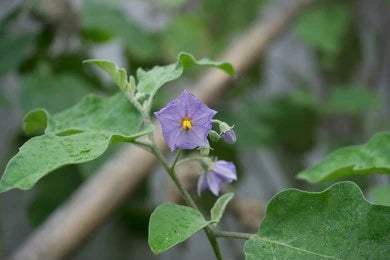One of the Ayurvedic herbs, kantkari, is very helpful for throat issues. This plant is often referred to as Indian Nightshade or Yellow-Berried Nightshade. Due to its numerous qualities, including anti-inflammatory, antitussive, anti-asthmatic, hypoglycemic, antipyretic, antihistamine, antispasmodic, etc., it is particularly useful in treating a variety of other issues than throat issues. Let's talk about this remarkable herb in more detail in the article that follows.
Systemic Classification
Botanical Name - Solanum Xanthocarpum
Family - Solanaceae
Genus - Solanum
Species - S.Virginianum
Synonyms
Kshudra
Dusparsha
Vyaghri
Nidigdhika
Kantalika
Kantakini
Dhvani
Other Vernacular Names
Hindi Name - Rengni
Gujarati Name - Bhonyarengni
Bengali Name - Kantikari
Tamil Name - Kandankantiri
Kannada Name - Nella Gullu
Telugu Name - Challan mulaga
English Name - Wild Eggplant
Habitat
This species is primarily found in India, Assam, and Bengal, as well as in waste areas and along roadsides.
Morphology
It is a perennial, thorny shrub that ranges in height from 0.75 to 1.25 meters. Its leaves measure 10–13 cm in length and 5-7 cm in breadth. It is shiny green in color. The dorsal side of the leaves has thorns, and the blue flowers are present. The Kantakari fruit is tiny, prickly, and oblong in shape. Fruits are green in color when unripe, with white streaks that turn yellow as they ripen. The summer is when Kantkari blooms.
Ayurvedic Properties
|
|
Hindi / Sanskrit |
English |
|
Rasa (Taste) |
Tikta, Katu |
Bitter, Pungent |
|
Guna (Physical Property) |
Ruksha, Laghu |
Dry, Light |
|
Virya (Potency) |
Ushna |
Hot |
|
Vipaka (Post-Digestive Taste) |
Katu |
Pungent |
Effect on Dosha
It balances Kapha and Vata Dosha
Practical Uses
Kantkari has the following numerous useful benefits:
- Apart from the fact that it helps with respiratory problems of various kinds, this herb also has the following advantages.
- When Kantkari juice is applied to the nose, it helps to stimulate the nerves, which is extremely helpful for disorders like convulsions and epilepsy.
- Its powder aids in boosting the digestive fire and stimulating appetite.
- This herb's laxative characteristics are extremely effective in causing purgation, which aids in the cleansing and deworming processes.
- This plant aids in blood purification and has an anti-inflammatory action, which supports heart health and aids in treating a variety of skin diseases and inflammatory illnesses.
- Honey and kantkari juice mixed together have diuretic effects, which aid in treating dysuria.
- Apply 30 to 50 cc of the plant's juice to the scalp for an hour, then wash it off with an herbal shampoo. This herb also helps with hair dandruff and supports healthy hair.
Part Used
Root, Fruit, Whole Plant
Chemical Composition
This herb includes chemical constituents such as B - Carotene, Carpesterol, Solasodine - L - Rhamnosy - B - D - Glucoside, Diosgenin, Solasodine, B - Solamargine, Solamargine, Solano Carpine, Solanine, tomatidine.
Dosage
Internal Use
- Swaras/Juice: 10-20 ml
- Churna/Powder: 3-6 gm
- Kwath/Decoction: 20-30 ml
External Use
For local use, one can use the juice or paste of it.

